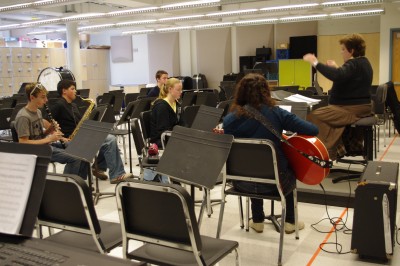Rachel Guetta’13
Opinions Editor
Staples Players is an award-winning organization that is “comprised of student actors and technical crews working together towards a common goal of learning the craft of theatre and providing quality productions to the Westport community,” according to the Players’ website.

That idea of crews working together towards a common goal of excellence is also what defines another group within Players that is not always recognized, despite their contributions to the productions: the pit orchestra.
“Pit orchestra is the lifeblood of any musical,” Adele Valovich, Conductor of the Pit Orchestra, as well as the Sophomore, Symphonic and Chamber Orchestras.
The pit orchestra is made up of eight students, though in past years there have been more student participants.
The group meets twice a week for an hour and a half and sometimes up to six hours during Hell Week, the final stretch of rehearsals before opening night.
Despite the frenzy that arises in the preparation for shows, Chelsea Steinberg ’12, assistant to the conductor and the pit orchestra’s manager, said that rehearsals have been running smoothly.
“This year I’ve been surprised because pit has been really great and [the musicians] really [have] known their stuff,” Steinberg said.
According to musician and actor Jake Landau ’13, the students generally listen to recordings of their pieces first, and then rehearse by playing the music through. During Hell Week, the actors join pit orchestra and all the facets of the production get strung together.
“Hell Week is called Hell Week for a reason— everything miraculously comes together then. There’s not a long time to put this monstrous, huge piece of theater together, but because we have very talented actors, musicians, directors and conductors, we get it together hopefully very well,” Landau said.
According to Steinberg and Landau, there is a strong sense of collaboration between the actors and musicians, although some feel as though pit orchestra does not get enough recognition.
“The actors deserve all the credit they get— they sing, they dance, they act. However, pit is difficult. And without the pit, the show would be boring and just not as good. Pit does deserve a lot more credit than they receive,” Landau said.
Steinberg agreed, saying, “The musicians have to know every single note, every single cue. It’s a ton of work that no one really sees. The actors have to memorize their own lines, but we have to know the whole show.”
However, Valovich pointed out that the role of pit orchestra is to accompany the action happening on the stage.
“The pit has done a really good job if nobody’s noticed us because we’ve achieved our accompaniment objective and blended in,” Valovich said.
Despite pit orchestra’s lack of credit, the musicians agree with Valovich in that their role in the group is primarily for accompaniment purposes.
“At times, it does feel like we don’t get enough credit. But at the same time, the pit’s job is to supplement the actors and support them—that’s our role, it’s to help them. In that regard, I understand why people don’t pay attention to us or recognize the work and time we put in,” Steinberg said.
In the end, being in the pit orchestra is about enjoying the music and enjoying being part of a larger project, a bigger experience.
“This is the best way for me to take my classical training [as a cellist] and play in a more modern way with music I listen to on a regular basis. It’s just a lot of fun,” Steinberg said.











































